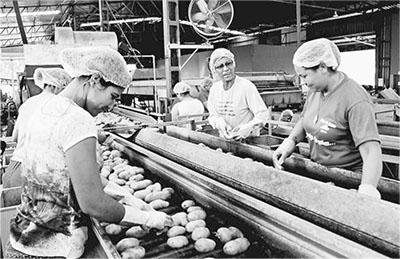Potatoes, the magic weapon for Brazilian farmers to get rich

Workers process potatoes at a farm in the Brazilian state of Minas.
Reporter: Wang Hailin Photographed
Minas state, located in the southeast of Brazil, produces one-third of Brazil's potatoes, ranking first among states, while most farms in Minas state are concentrated around the city of Uberaba. Uberaba is a small and medium-sized city with a population of only over 300,000. The reporter drove 40 minutes from Uberaba to Sun Farm and met Taz, one of the contractors of the farm.
Taz looked to be in his early forties, dressed in a light blue casual shirt and blue jeans. He was handsome and did not look like a farmer at first glance. But Taz, who graduated from Brazil's famous university majoring in agriculture, is a real Brazilian modern farmer. Brazil Minas agricultural technology and development company head Thomas told this reporter that with the advancement of agricultural technology, the former family workshop farms in Brazil gradually reduced, and with advanced agricultural technology professionals contracted farms are increasing.
Taz, for example, has contracted land for farms in Minas and Sao Paulo. At Sun Farm near Uberabad alone, Taz has contracted 680 hectares of land to grow potatoes, soybeans, black beans, corn and other crops. The potato planting area reached 430 hectares. Taz spent most of his time tending the land himself, walking around the farm a few times a day and hiring people to help him harvest during busy harvests. According to Taz, there are not a few modern farmers like him in Brazil.
The reporter saw a very advanced agricultural irrigation system at the scene, neatly arranged in the field. In the drizzle, Taz stood in front of neat rows of potato seedlings and told his entrepreneurial story. 'Farmers are really bad in Brazil,' says Mr. Taz.'They have a lot of upfront costs and a lot of risk later on.' Take the land he contracted as an example. From planting potatoes to maturity, it takes 12 sprays, which cost 12,000 reais (1 reais about 2.3671 yuan) each time, and the annual cost of spraying only one item is 144,000 reais. In addition, contract costs are very high, only 430 hectares of land planted potatoes, the annual contract costs to pay farmers 688,000 reais. According to Taz, his annual gross profit is 9 million reais, but excluding contract costs, production and transportation, pesticide spraying, harvesting and other expenses, he can only earn about 200,000 reais a year, income is not particularly large.
Taz smiled mysteriously about why he used most of the land to grow potatoes, saying it was his biggest "magic weapon" for making money. Under the reporter's inquiry, Taz uncovered the secret of large-scale potato cultivation. Due to the relatively large potato consumption of Brazilian people, Brazilian potatoes are basically not exported to the outside world and can be consumed in Brazil itself. Brazilians love potatoes. Mashed potatoes, boiled potatoes, potato salad and French fries can be found everywhere in Brazilian restaurants and ordinary people's tables.
According to Thomas, the price of Brazilian potatoes is mainly determined by the supply and demand situation in the Brazilian market. Therefore, due to weather and other reasons, the price fluctuation of potatoes is relatively large, and it is easy to obtain high profits from planting potatoes. In good years, potatoes alone can double Taz's income. However, high profits also mean high risks. If the price of potatoes drops sharply in one year, he will lose a lot. Taz himself complained to reporters that at the beginning of 2013, the potatoes he harvested finally sold for only 8-10 reais a bag, each bag was 50 kilograms, far from the estimated 28 reais per bag when he planted potatoes, so he complained. It is also to avoid the risk of planting potatoes in large quantities that Taz planted corn and other crops on some of the land. Taz is optimistic about this year's potato market, which has risen to 60 reais a bag. Taz excitedly said that if the income this year is good, he plans to travel to Europe and hopes to go to China and other Asian countries in the future.
- Prev

National Agricultural Science and Technology Service Cloud platform officially launched
National Agricultural Science and Technology Service Cloud platform officially launched
- Next

Aquaculture eats nearly half of antibiotics in China: soil and rivers polluted by feces
Aquaculture eats nearly half of antibiotics in China: soil and rivers polluted by feces
Related
- A course of planting techniques and methods on how to grow carrots
- How to plant the latest tulips?
- Is it better to pick tea in the morning or in the afternoon? When is the best time for tea to be picked? what is the third or fifth tea?
- Launch Yuanxiao Happy combination Haocha + Tea Yuan healthy Taste
- Penghu Tourism "Fireworks 20 Parade with You"
- 2022 West Lake Happiness holds "Digital Revitalization Voucher" and draws iphone13 and laptop.
- Banqiao Fuzhou social houses are designed to change start-up combined with police elimination to create a safe and livable environment
- The convenient measure of "mechanical weeding" in Xinbei has been abused and the Agriculture Bureau has imposed heavy penalties on the illegal land consolidation.
- Changgeng University Joins Hands with Four Memory Factories to Rescue Memory Talent Shortage
- The list of Taiwan's top 100 MVP managers is listed by the Director-General of the Farmers' Association of Sanxia District.

